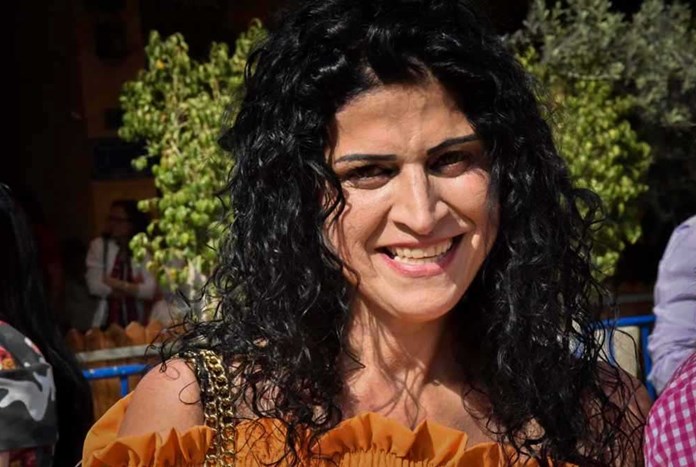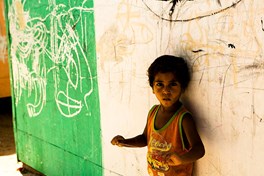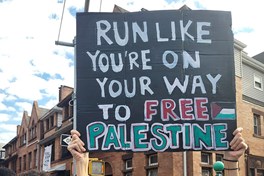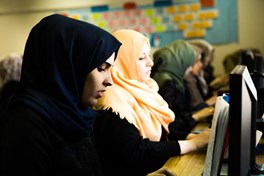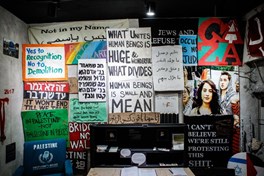“As women, we have to work vertically at a national level to make the change but also horizontally with other women to empower one another and this is the work that Wi’am is committed to and which we undertake with other women in Bethlehem and across the West Bank.” Meet Lucy Talgieh from Wi’am Conflict Resolution Centre in Bethlehem.
“As I started working on this I realised how much I suffered from a patriarchal society, and in my own home, where men make all the decisions. I am really passionate about changing this.” Lucy Talgieh from Wi’am Conflict Resolution Centre in Bethlehem.
At Christmas, Bethlehem has a different feel — there is an excitement and an expectation as we get ready to welcome the King.
I always go to the grotto and sing my favourite carols. I’m never quite sure what they are called in English but with the choir, I used to love singing ‘Oh Come All Ye Faithful’, I guess it is my favourite.
But for us, it is not just Christmas — we have a message of Easter and Resurrection. Jesus carried the cross for 14 stations on his Via Dolorosa — we have had to carry the cross for over 70 years and now, the Christian community is only 1% of the population and we wonder if we will be here at all in 25 years time.
It is why statements like the Kairos Palestine call are so important, as they call on the whole Christian world to help us to change our situation. It was such a privilege to be recommended to be the youngest author of Kairos Palestine and one of only a few women.
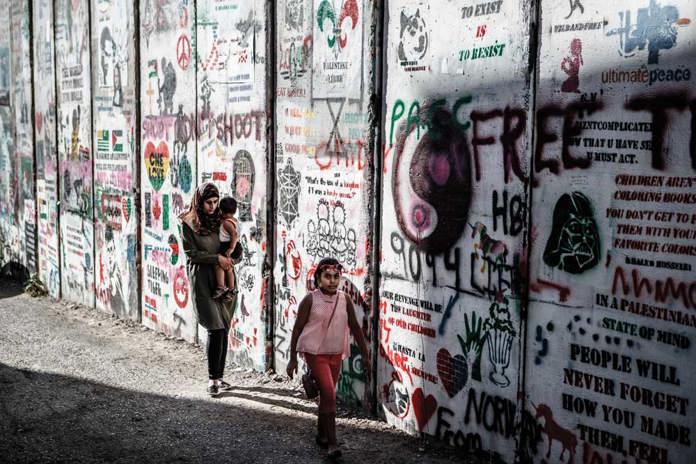
Bethlehem today:
A mother and her children walking along the illegal Israeli Separation Wall close to Wi’am’s office. The Wall cuts through Bethlehem surrounding it on three sides.
When Zoughbi first asked me to head up the work with women at Wi’am, I did not want to leave the work I was doing with the young people, but I am so glad I did. As I started working on this I realised how much I suffered from a patriarchal society, and in my own home, where men make all the decisions. I am really passionate about changing this.
For all of us in Palestine, the biggest issue we face is the Occupation which dominates every aspect of our lives. But if I were to choose the three other things that most affect women, I would say firstly economic independence — women have such little economic independence in their homes and it restricts their ability to make key decisions.
When Zoughbi first asked me to head up the work with women at Wi’am, I did not want to leave the work I was doing with the young people, but I am so glad I did.
The difficult economic situation we face means that if women are able to become more economically independent, it will also bring money into the house and we have seen that it transforms their homes, it reduces domestic violence and their children see things differently.
Secondly, education — we need to educate women but especially girls and boys so as to change the patriarchal society we live in and the male domination we experience. Thirdly, women need to take part more in politics — our representation is capped at 20% — that is the quota for women to hold positions in office and we need to change this. To start with, 20% was to empower us, now it holds us back but Fatah and Hamas do not want to change this, they say 20% is enough, no more.
I have been elected as a councillor in the Bethlehem district and while we used to have a female Mayor, there are so few women involved in politics and heading up organisations. The higher up you go, the fewer women you see, and it is essential that women are much more involved in the peace process. At Wi’am, we believe that women can make the change, especially with peace-building.
The higher up you go, the fewer women you see, and it is essential that women are much more involved in the peace process.
As women, we have to work vertically at a national level to make the change but also horizontally with other women to empower one another and this is the work that Wi’am is committed to and which we undertake with other women in Bethlehem and across the West Bank. This is why our work with women is so important.
— — — — — — — —
Watch our short film about Wi’am Conflict Resolution Centre in Bethlehem.
